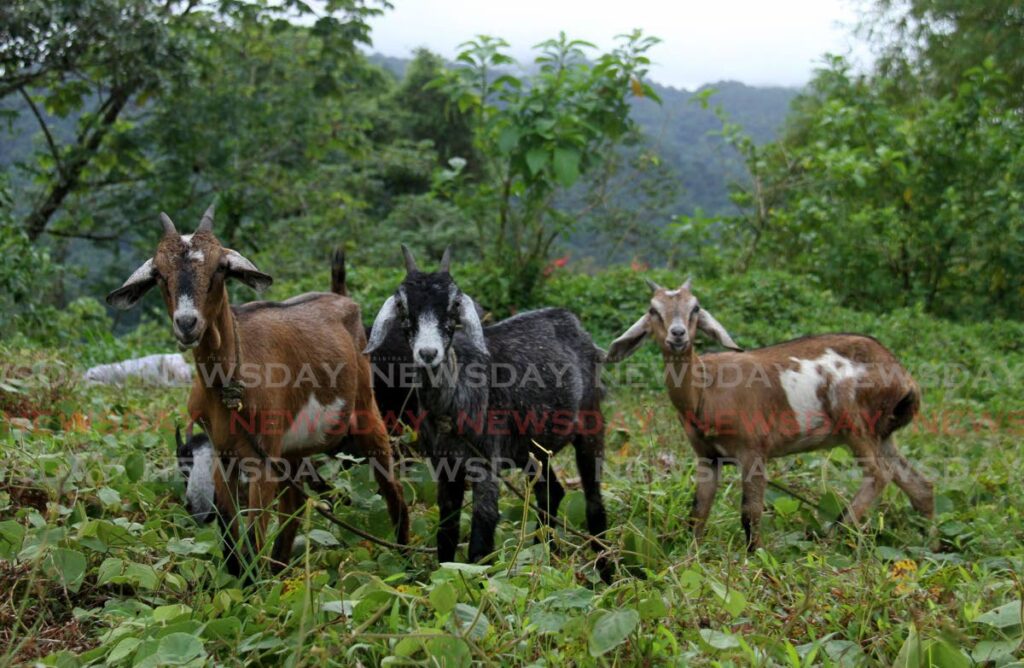Animal smuggling crippling goat, sheep industry

Goat, sheep and cattle being smuggled into the country from Venezuela is crippling the operations of some farmers who intend to push back by offering healthy, fresh meat at competitive prices.
The small ruminant industry, primarily goat and sheep, could be decimated if the illegal trade is allowed to continue, says president of the Goat and Sheep Society Ravi Renie.
Renie said roadside stalls offering bargain prices for goat, lamb meat is a sure-tell sign that the source of the animal was not from local farmers but rather sneaked in under the cover of night on pirogues from the mainland.
These animals, he said, have the potential to carry diseases such a foot and mouth disease which can decimate the local industry if there was cross contamination.
To combat the illegal trade the society started an initiative with the government-certified abattoir at the Sugarcane Feeds Centre, at Pokhor Road, Longdenville offering fresh meat at a reduced cost. Goat and lamb usually sells for $45-$50 a pound but at the abattoir consumers can get meat for $35-$38 a pound.
"Farmers are going to be taking a little bit of a hit with it but we think that once we get the meat out into the mainstream market and people compare the quality, they will see the difference," Renie said.
The partnership with the abattoir guarantees a health inspector to be on duty to monitor the animals before slaughter for any signs of disease during the quarantine period and if any issues are detected the animals will not be killed and sold, Renie said.
He said qualified butchers will also "humanely slaughter, halal the animals which is very important for our consumers, and it would have been handled under sanitary conditions. The meat is going to be chilled and available to the consumer."

Renie said the society is also in talks with local supermarkets to offer fresh meat for sale as he noted almost 99 per cent offered for sale at groceries is imported from countries like New Zealand as it embraces the Caricom initiative to reduce food imports by 25 per cent by 2025.
"We may not be able to supply to feed the entire country but if we can target 10 to 20 per cent it could put a dent in what we are doing and if you have that reliable market through the supermarkets then the farmers could now improve their productivity knowing that there is a reliable demand."
"We are accustomed to this New Zealand lamb, that is fatty, those animals are sometimes, five to six years old, when they come they are freezer burned, we are trying to change the palette from 'old meat to fresh meat.' Lamb by definition is six months to one year. What we are importing is mutton. So the palette of the consumer is really for mutton. Our animals are going to be between eight to 12 months," he said.
"If we as farmers have to import animals, the animals must be tested, they must get a bill of health, you must get a permit to bring it in. It costs time and money to bring in the animal. When you have animals coming in through the back door, you find that those things are not done and where they are coming from on the mainland where there are the diseases which are endemic on the mainland that are not reported here in TT."
He said there have been increasing reports of animals being smuggled into the country and the society is liaising with the Ministry of Agriculture and launched a public campaign to highlight the dangers. Renie said he had even discussion the issue with Prime Minister Dr Rowley, a registered member of the goat and sheep society, and he believes a co-ordinated effort, media sensitisation, will bring more focus on the issue.
"If it continues and goes unchecked that would definitely be the end of small ruminants industry."
Agriculture Minister Kazim Hosein said on Saturday that he intends to address the issue on Monday with farmers at the Sugarcane Feeds Centre and declined further comment.
Renie said one of the busiest periods for goat and sheep farmers was the Muslim festival of Eid-ul-Adha where animals close to 2,000 animals are slaughtered and shared among families. But he believes if more people experience fresh meat over frozen meat they will make the switch.
He says the partnership with international chefs for Goatober, in the month of October, where goat meat is marketed and promoted in cuisine has helped boost sales pre-covid but the society is now "jumping back out" and soon will be hosting curry goat competitions and other events.

Comments
"Animal smuggling crippling goat, sheep industry"